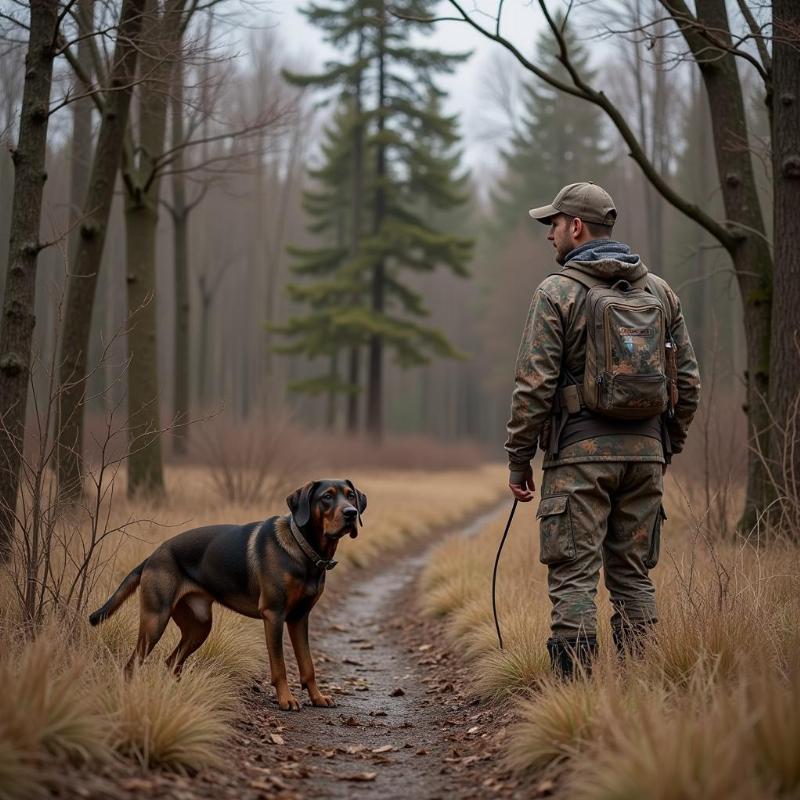Finding a downed deer after a shot can be challenging, but a well-trained blood tracking dog can make all the difference. The best dog for blood tracking deer possesses a unique combination of physical attributes, temperament, and trainability. Choosing the right breed and dedicating time to training is crucial for successful tracking.
Key Traits of a Successful Blood Tracking Dog
Several breeds excel at blood trailing, and while breed isn’t everything, certain traits are highly desirable. A keen sense of smell is paramount. Look for breeds known for their scenting abilities like scent hounds. Stamina and endurance are also essential for following a trail over long distances and challenging terrain. A focused temperament, eagerness to please, and a strong prey drive are other important qualities.
Top Breeds for Blood Tracking Deer
While many breeds can be trained to track, some consistently stand out. Consider these top contenders:
- Dachshund: Their low-to-the-ground build and excellent nose make them surprisingly effective trackers.
- Bavarian Mountain Hound: Bred specifically for tracking wounded game, this breed possesses remarkable scenting abilities and stamina.
- Hanover Hound: Another excellent trailing hound, the Hanover Hound is known for its endurance and determination.
- Drahthaar: Versatile and intelligent, the Drahthaar’s strong scenting abilities and robust build make it a great choice for various hunting scenarios.
Training Your Dog for Blood Tracking
Training a blood tracking dog requires patience, consistency, and the right techniques. Start early by introducing your puppy to the scent of blood. Use deer blood or commercially available training scents. Create short trails initially, gradually increasing the length and complexity as your dog progresses. Positive reinforcement methods are essential. Reward your dog with praise and treats when they successfully follow a trail.
Essential Training Equipment
Having the right equipment can make training more effective:
- Tracking Harness: Provides better control and prevents your dog from pulling too hard on the trail.
- Long Tracking Lead: Allows your dog to work independently while maintaining a safe distance.
- Training Scents: Deer blood or commercial scents are essential for creating practice trails.
- Rewards: High-value treats and enthusiastic praise motivate your dog to succeed.
Legal and Ethical Considerations for Blood Tracking Deer
Always check local hunting regulations regarding the use of tracking dogs. Some states may have specific requirements or restrictions. Ethical hunting practices are paramount. Ensure your dog is well-trained and capable of efficiently locating wounded deer to minimize suffering. Respect property boundaries and obtain permission before tracking on private land.
Tips for Successful Blood Tracking
- Start Tracking Immediately: The fresher the trail, the easier it is for your dog to follow.
- Mark the Last Known Location: This provides a starting point for your dog.
- Trust Your Dog’s Nose: Even if the trail seems faint, your dog can likely detect scents you can’t.
- Be Patient: Tracking can take time, especially in challenging terrain.
![]() Hunter with Tracking Dog
Hunter with Tracking Dog
Conclusion
A well-trained blood tracking dog is an invaluable asset for ethical and responsible hunting. By choosing the right breed and employing consistent training methods, you can significantly improve your chances of recovering downed deer. Remember to adhere to local hunting regulations and prioritize ethical hunting practices at all times. Selecting the best dog for blood tracking deer requires careful consideration, but the reward of a successful track is well worth the effort.
FAQ
- What is the best age to start training a blood tracking dog? Ideally, start introducing your puppy to blood scents around 8-12 weeks old.
- How long does it take to train a blood tracking dog? The training timeline varies, but it typically takes several months of consistent practice.
- Can any dog be trained to track blood? While many breeds can learn, some have natural aptitudes that make them more successful trackers.
- What should I do if my dog loses the trail? Return to the last known location and try to re-establish the scent.
- Are there any certifications for blood tracking dogs? Yes, organizations like the United Blood Trackers offer tracking dog evaluations and certifications.
- What is the most important trait in a blood tracking dog? A keen sense of smell is the most crucial attribute for successful tracking.
- What kind of equipment do I need for blood tracking? Essential equipment includes a tracking harness, a long lead, training scents, and rewards.
Beautdogs.us is your premier online destination for all things dog-related in the US. We offer expert advice on dog breeds, care, and products, catering to both new and experienced dog owners. Beautdogs.us is committed to providing reliable, comprehensive, and engaging information to help you and your canine companion thrive. Contact us at [email protected] or +1 501-555-7529 for expert guidance and personalized recommendations.
